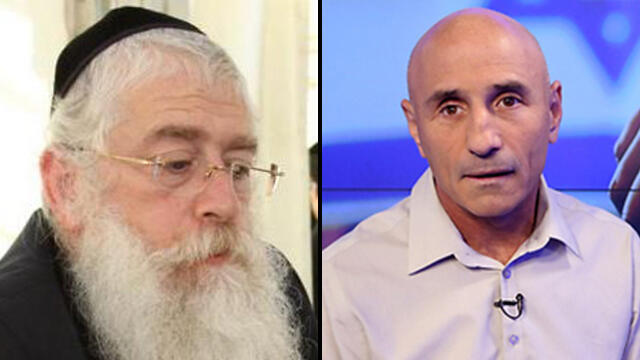Getting your Trinity Audio player ready...
Minister of Defense Avigdor Lieberman proclaimed Wednesday that "Anyone over the age of 18 must enlist," only one day after the High Court of Justice struck down an amendment regulating yeshiva draft exemptions.
Speaking at an event marking for the Jewish New Year, Lieberman stressed that "We're not waging war on the Haredi parties or the High Court." Rather, he said that "We're trying to take a common sense approach to the problem."
The High Court decreed on Tuesday that the most recent amendment to the Conscription Law—providing army draft exemptions to a large number of yeshiva students—be canceled within a year .
3 View gallery


Minister of Defense Lieberman spoke about the High Court's ruling Wednesday (Photo: Ohad Zwigenberg)
(צילום: אוהד צויגנברג)
The HCJ's ruling stated that a previous Knesset decision that sought to provide many 18-year-old Haredim with a pass on the mandatory IDF draft, was "disproportionate" and "harmed equality" within Israeli society.
“We are compelled to return the matter back to the Knesset,” concluded Supreme Court Chief Justice Miriam Naor. “At this stage, and after years of trial and error, it is clear that it is no longer enough to make do with non-binding and non-enforceable arrangements whose outcome is unknown."
In an apparent comparison to the backlash staged by US citizens to the Vietnam War, Lieberman stated that "In the United States, thousands demonstrate(d—ed) outside of the White House, not understanding why American soldiers have to die in the jungles of southeast Asia."
Despite such criticisms against soldiers' deaths in battle, Lieberman stated that he believes that "people who are tightly-knit and filled with motivation eventually win the day.
Speaking of the HCJ's Tuesday decision, Lieberman posited that "the guiding parameter for us is definitely national strength."
"We're definitely talking about service for everyone," Lieberman made plain. "Service for everyone, not more first-class and second-class (distinctions). Every young person reaching the age of 18 has to either enlist or perform national service. It cannot be any other way."
Lieberman then clarified that his statements pertain to members of all faiths—Jews, Christians and Muslims. "I don't understand why a Haredi man can't serve in the army. And if he doesn't want to, then (he may go into) national service. There are enough challenges in any field," the minister added.
Israel's political arena has been all aflutter in the 24 hours since the majority decision—eight of the nine judges in favor—reached by the expanded panel discussing the petition.
MKs from the Haredi parties held an emergency conference Wednesday following the decision. "Those who wish to study the Torah will do so without interruptions. No one will remove us from the world of the Torah," said MK Meir Porush of United Torah Judaism.
3 View gallery


MKs Meir Porush (United Torah Judaism) and Ofer Shelah (Yesh Atid) both weighed in on the issue (Photo: Avi Moalem, Yaron Brener)
(צילום: אבי מועלם, ירון ברנר)
"What do you want, the High Court to rule over everything we do in this country? It's inconceivable that people who no one has elected think they hold the absolute truth," Porush said. "How could 15 people take over the reins of power? As for the equality the High Court is so concerned about, there are a million Arab citizens here. Does the High Court also wish to discuss their service?"
Porush also commented on the Haredi parties' next move. "We'll do everything," he promised. "The court wants legislation? It'll get legislation. We still have a year left, during which we'll do everything in our power to make sure anyone who want to study the Torah will be able to do so. We have spiritual protection, which isn't subject to the High Court of Justice."
Representing the other side of the issue, MK Ofer Shelah of Yesh Atid—who served the petition protesting the amendment in the first place—welcomed the decision.
"It was clear to me from day one that the bad amendment the government nevertheless passed won't stand the High Court's test," he said. "It goes against previous rulings and, moreover, it's unjust and does nothing for Haredi conscription."
"At the end of the day Benjamin Netanyahu has to decide whether he intends to govern Israel or let the Haredi parties do it," challenged Shelah. "Does he intend to lead Israel to shared values, or throw that all away and return from the High Court time and again by the skin of his teeth. The entire current coalition—save for the Haredi parties—voted for (the original—ed.) law in the Knesset and all they have to do is get back to that. If they don't, all of those values—both of the IDF and Israeli economy—are of no interest to them at all."


